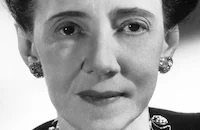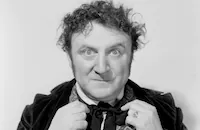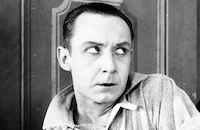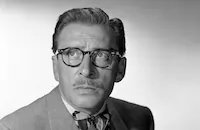Bluebeard's Eighth Wife

Brief Synopsis
Cast & Crew
Ernst Lubitsch
Claudette Colbert
Gary Cooper
Edward Everett Horton
David Niven
Elizabeth Patterson
Film Details
Technical Specs

Synopsis
Nicole De Loiselle meets American millionaire Michael Brandon while shopping in a store on the French Riviera. She buys the bottoms and he buys the tops of the same suit of pajamas, while she gives him tips on how to cure insomnia by spelling Czechoslovakia backwards. Michael continues to have insomnia, however, and demands to change his suite at the hotel. The managers show him a room but the Marquis De Loiselle is residing there. The marquis tries to convince Michael to go in on a deal with him, but Michael refuses until he recognizes the pajama bottoms and the marquis identifies himself as Nicole's father. Michael agrees to buy a Louis XIV bathtub from the penniless marquis as a gesture of good will and informs the marquis he wishes to marry his daughter. Michael later proposes to Nicole while she is at the beach with her friend Albert De Regnier, but she refuses because he seems arrogant. Michael then sends an apology and an invitation to dinner and they fall in love that evening. At her engagement party, however, Nicole discovers that Michael had been married seven times previously, and each time had arranged a $50,000 per year divorce settlement in a pre-nuptial agreement. Nicole furiously calls off the wedding, but then agrees to marry for a $100,000 settlement. They never consummate the marriage and live in separate rooms, despite attempts by Michael to bridge the gap. Nicole finally wears down Michael's resistance by pretending to have an affair with Albert, and Michael agrees to a divorce. He commits himself to a sanitarium because Nicole completely broke his spirit, but with their newfound wealth, the marquis buys the sanitarium and Nicole pledges her love to Michael.

Director

Ernst Lubitsch
Cast

Claudette Colbert

Gary Cooper

Edward Everett Horton

David Niven

Elizabeth Patterson

Herman Bing

Warren Hymer

Franklin Pangborn
Armand Cortes
Rolfe Sedan

Lawrence Grant
Lionel Pape
Tyler Brooke
Tom Ricketts
Barlowe Borland

Charles Halton
Sally Martin
Olaf Hytten
Grace Goodall
Jimmie Dime

Pauline Garon
Eugene Berden
Ray De Ravenne
Jean De Briac
Sheila Darcy
Harry Lamont
Blanche Franke
Jacques Vanaire
Joseph Romantini
Michael Visaroff
Alphonse Martell
Paul Pryar
Harold Minjir
Gino Corrado
Alex Weleshin
George Davis
Albert D'arno
Mariska Aldrich
Paul Gustine
Hooper Atchley
John Picorri
Albert Petit
Terry Ray

Joseph Crehan
Wolfgang Zilzer

Leon Ames
Henry Roquemore
Barbara Jackson
Marie Burton
Joyce Mathews
Paula De Cardo
Gwen Kenyon
Suzanne Ridgway
Lola Jensen
Carol Parker
Dorothy Payton
Norah Gale
Harriette Haddon
Ruth Rogers
Dorothy White
Gloria Williams
Crew
Travis Banton
Charles Brackett
Hans Dreier
Farciot Edouart
A. E. Freudeman
Werner Heymann
Frederick Hollander
Don Johnson
William Lebaron
Joseph Lefert
John M. Leipold
Ernst Lubitsch
Ernst Lubitsch
Harry Mills
Boris Morros
Charles Schoenbaum
William Shea
Edward Sullivan
Leo Tover
Robert Usher
Billy Wilder
Adolph Zukor

Videos
Movie Clip




Hosted Intro
Film Details
Technical Specs

Articles
Bluebeard's Eighth Wife -
Wilder, who was Jewish, fled Europe for Hollywood in 1933, and landed a job at Paramount without making much of an impression at first, contributing stories and uncredited bits of screenplays. That changed when the studio paired Wilder with Brackett, an east coast patrician fourteen years his senior. Their unlikely partnership was contentious, but as Wilder noted, "Sometimes we would argue violently, but that was good, that was how we got along. He forced me to think in English, especially when I argued with him, which was a lot...I was excited at the idea of working with Lubitsch. One thing Brackett and I agreed on was Ernst Lubitsch."
The opening scene of Bluebeard's Eighth Wife is a classic "meet cute," classic Lubitsch, and classic Brackett and Wilder. Cooper and Colbert are both shopping for men's pajamas; he wants only the tops, and she wants only the bottoms. Before long, they're sharing more than just pajamas, and a whirlwind courtship leads to marriage. But as in all screwball comedies, especially Lubitsch's, that's only the beginning of complications, misunderstandings, and general comic mayhem. The inspiration for the film was apparently the life of much-married millionaire Tommy Manville, who wed eleven women and had thirteen marriages (he divorced and re-wed one, and stayed married to another). Although the original source material for the film was about a nobleman who marries often and murders his brides, there are no dead spouses in Bluebeard's Eighth Wife . It's played strictly for laughs, as clever Colbert makes sure that Cooper's eighth wife is his last.
A pre-stardom David Niven is fourth-billed in Bluebeard's Eighth Wife , as one of Colbert's admirers. Niven was thrilled to be in such stellar company as Colbert and Cooper, and even more so to work for the first time with Lubitsch. So was Wilder, who called Lubitsch "the best writer that ever lived." In his autobiography, Niven described Lubitsch as sitting "like a little gnome, beside the camera, perched on a step ladder, giggling and hugging himself at all his own wonderful inventiveness...I learned major lessons about playing comedy during that time and will forever remember a statement of his: 'nobody should play comedy unless they have a circus going on inside.'"
Brackett and Wilder's fraught partnership continued through more than a dozen memorable films, including comedies like Lubitsch's Ninotchka (1939), and Howard Hawks's Ball of Fire (1941), and dramas like The Lost Weekend (1945), and their final film together, Sunset Boulevard (1950), both of which Wilder also directed. Brackett took on producer duties, but the collaboration that thrived on conflict had stopped working. As Wilder diplomatically explained it, "The sparks weren't flying anymore." Brackett found out that their partnership was over not from Wilder, but from a studio press release.
The team that Wilder himself had jokingly called "the happiest couple in Hollywood" went their separate ways, and each had his own success, Brackett moving to 20th Century Fox as a writer and producer. Wilder's career and his subsequent writing collaboration with I.A.L. Diamond produced many hits, and with 1960's The Apartment, Wilder became the first person to win Oscars for writing, producing and directing the same film. But none of Brackett's subsequent films were as brilliant as those he wrote with Wilder. Recalling the end of their partnership, Brackett wrote, "It was such a blow, such an unexpected blow. I thought I'd never recover from it. And in fact, I don't think I ever have."
Producer, Director: Ernst Lubitsch
Screenplay: Charles Brackett and Billy Wilder
Cinematography: Leo Tover
Editor: William Shea
Costume Design: Travis Banton
Art Direction: Hans Dreier, Robert Usher
Music: Boris Morros
Principal Cast: Claudette Colbert (Nicole de Loiselle), Gary Cooper (Michael Brandon), Edward Everett Horton (Marquis de Loiselle), David Niven (Albert de Regnier), Elizabeth Patterson (Aunt Hedwige), Herman Bing (Monsieur Pepinard), Warren Hymer (Kid Mulligan), Franklin Pangborn (Assistant Hotel Manager), Armand Cortes (Assistant Hotel Manager), Rolfe Sedan (Floorwalker), Lawrence Grant (Professor Urganzeff)
84 minutes
by Margarita Landazuri

Bluebeard's Eighth Wife -
Quotes
Trivia
Notes
A news item in AC notes that Charles Schoenbaum took over photography when Leo Tover was stricken with influenza. Copyright records indicate that Marlene Dietrich acted as a guide for Eric Locke and crew in Vienna, where they shot 30,000 feet of film, some of which are used in the film. In addition, noted French director Sacha Guitry appears in one scene. Composer Werner R. Heymann's name is spelled "Werner Heyman" in the onscreen credits. A previous film based on the same source was released by Paramount in 1923 as Bluebeard's 8th Wife starring Gloria Swanson (see AFI Catalog of Feature Films, 1921-30; F2.0497). According to a modern source, Ernst Lubitsch promised the part of "Nicole" to Claudette Colbert as early as 1932, during production of DeMille's The Sign of the Cross (see below).

Miscellaneous Notes
Released in United States March 28, 1995
Released in United States on Video March 28, 1995
Shown at Cannes International Film Festival (Retrospective) May 9-20, 2001.
35mm
b&w
Released in United States March 28, 1995
Released in United States on Video March 28, 1995














